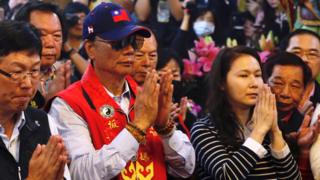As more singles live alone, businesses
cater to their needs
| FOCUS TAIWAN
Taipei, March 27 (CNA) Single-person
households have become more popular in Taiwan in the past decade and now there
are an increasing number of services catering to those living alone.
Taiwan had 2.747 million single-person
households by the end of 2016, accounting for 32.09 percent of all households
in the country, up from 2.023 million in 2007, according to the Ministry of the
Interior statistics.
Singles are most prevalent in urban area.
The single-person households accounted for 34.92 percent, 34.51 percent and
34.25 percent of all households in Taipei, New Taipei and Kaohsiung,
respectively, in 2016.
In the past, single thirty-somethings or
older tend to stand out in social or family gatherings, but about 40 percent of
people between the ages of 30 to 39 were unmarried in 2015, according to a
statistics by the Ministry of the Interior.
Anyone unmarried is single, but he or she
does not necessarily live alone. Some married people live alone, while many
unmarried people live with their partners or children. As there are more single
people in society, however, people who live alone tend to be more numerous too.
Businesses are starting to take notice of
this consumer group.
A new variant of papaya produced by Yang
Chien-te (楊乾德), a farmer in Gaoshu Township in
Pingtung County, is about half the weight of the current ones on the market,
and is sold for about NT$80 (US$2.65), suitable for a person to eat during
breakfast. It has been welcomed by local consumers.
Recipe books for people living alone have meanwhile
become popular mainly among women aged 30 and up, and especially for women in
the 40-44 age group, according to Books.com.tw (博客來),
Taiwan's largest online bookstore.
Travel books for solo travel are also
selling well and some 80 percent of its buyers are women, it said. As a case in
point, Chinese translations of picture books by Japanese woman author Naoko
Takagi, who has published some 30 books on living alone since 2003, have been
popular in the past decade.
Single people, however, admit there are
inconveniences and awkward moments.
A 30-year-old public servant, surnamed
Wang, who rents an apartment with her elder sister in Taipei, said she and her
sister both dine out since they have different work shifts.
Wang said finding someone to have dinner
with is not easy, because married coworkers have to go home and unmarried ones
might have a date or other arrangements. So "single friendly restaurants
are a salvation" for us unmarried people, she said.
Chang Hua-chen (張華宸), a barbecue restaurant owner, said his motivation to open his
single friendly eatery was due to his own experience of being discriminated
against in a lamb and goat barbecue restaurant.
He never thought his restaurant would
become popular among singles, but now nearly 40 percent of all customers are
singletons, Chang said.
Business owners have meanwhile noticed
single people have different consumption habits.
Shen Yu-wei (沈佑威), a spicy
hotpot restaurant owner, said single customers normally spend 50 minutes in a
meal, while two customers might spend an hour and a half.
Shen said despite not taking as much time
eating, single customers interestingly spend on average more than customers in
a group.
"About 30 percent of our monthly
revenue, which is nearly NT$1 million, comes from single customers," he
said.
智慧手機讓人受傷
10 smartphone injuries that can easily be
avoided
Sarah Jacobsson Purewal
Phone meets face
You’re not the only person who’s gotten a
black eye because you dropped your phone on your face while texting in bed.
According to a study commissioned by the UK-based National Accident Helpline, a
whopping 60 percent of 16-24 year olds are in the same boat.
Distracted walking
Walking is, apparently, really hard. So
hard, in fact, that human beings cannot walk and perform other
mentally-challenging tasks, such as texting, simultaneously. According to the
this report from the Governors Highway Safety Association, pedestrian
fatalities are on the rise because we are just that terrible at walking.
Tech neck
As you get older, your body starts to hurt.
You might have back pain, knee pain, or even neck pain—regular wear and tear
can’t be avoided. But by “older,” we’re talking 55, not 25. If you’re a
millennial with neck pain, it’s probably because you spend too much time
hunched over your phone on the toilet.
Phone madness
Technology makes people insane. Saving
money on technology makes people even more insane. In 2013, at least 20 people
were injured when a frenzied South Korean mob tried to grab vouchers for a free
LG phone.
Repetitive strain injuries
Think you can’t get carpal tunnel from your
phone? Think again. Repetitive strain injuries don’t just affect your wrists.
Check out this case study of a 29-year-old who ruptured a tendon from playing
too much Candy Crush.
Selfie deaths
People are not the only victims of stupid
selfie stunts. Innocent animals, such as this baby dolphin that has almost
certainly never owned a smartphone, are also at risk. Repeat after me: SELFIES
KILL.
Selfie stick deaths
Selfies alone are killing people, so what
could possibly go wrong if we introduce a four-foot-long metal rod into the
picture? Nothing, right? Selfie sticks are also pretty dangerous. In 2015, a
person was struck by lightning and killed while holding a selfie stick (the
stick attracted the lightning, naturally), while another person ended up
crashing his car because he was trying to get the perfect selfie (on a stick).
Selfie sticks are even a danger to international landmarks: Two American
tourists were arrested in 2015 for carving their initials into the Colosseum
with a selfie stick.
Tripping over a charging cable









